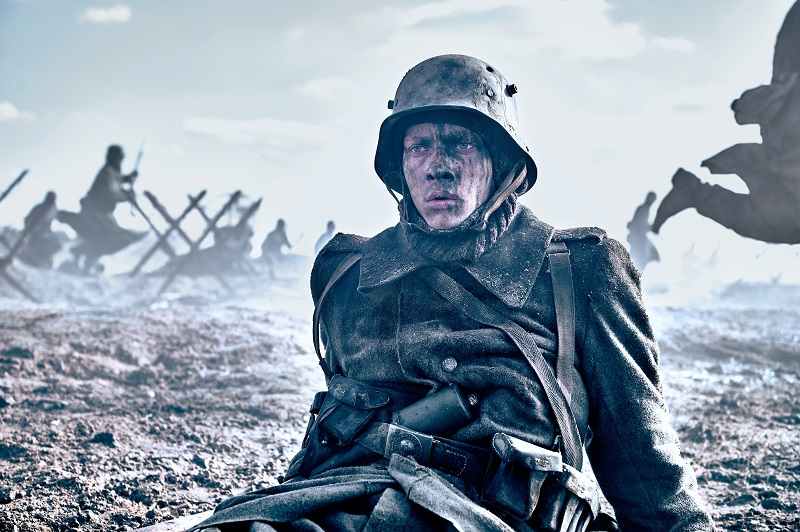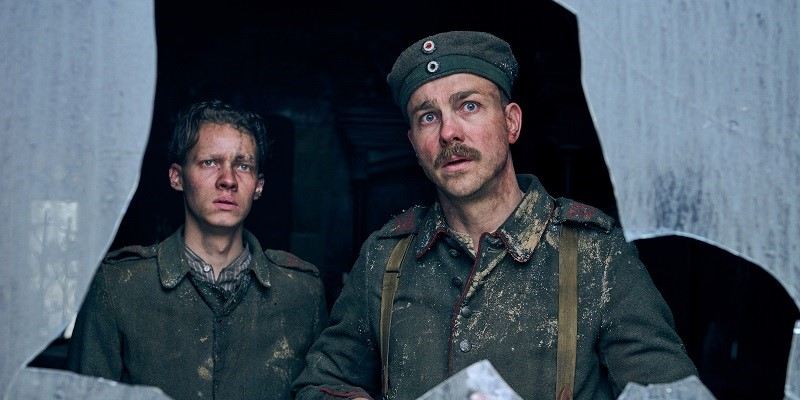‘All Quiet on the Western Front’: A German’s grim view of World War I

Felix Kammerer in “All Quiet on the Western Front.”
17:04 JST, October 13, 2022
There are times in “All Quiet on the Western Front,” Germany’s official Oscar submission, that you might be reminded, more than a little, of “1917,” Sam Mendes’s Oscar-winning 2019 film, also loosely based on real events during World War I. The new movie – the first German-language adaptation of German veteran Erich Maria Remarque’s semi-autobiographical 1929 bestseller, later banned under Nazi rule for its antiwar sentiments – includes many echoes of Mendes’s film.
It opens in 1917, features a star (Felix Kammerer) who looks uncannily like “1917’s” George MacKay, and includes all the visual trappings of the earlier film: muddy trench warfare, misery, violence and frequent scenes of a raw recruit running across a corpse-strewn battlefield, filmed in a way that somehow aestheticizes the bleak, bloody horrors of battle. (Something to think about: Can there ever truly be a purely antiwar film, when so many movies on the theme are so terribly stunning to look at?)
There are also several differences between the two films. Mostly, “All Quiet” is not so breathtakingly, heart-stoppingly cinematic. Yes, it’s handsomely shot, but there are long sequences where little happens. True to life, perhaps, but slow.
“All Quiet,” of course, is told from the perspective of a German, not an Allied soldier: Kammerer’s 17-year-old Paul Bäumer, who lies about his age on his enlistment form and is quickly disabused of his notions about marching victorious into Paris without obstruction. As in the book, Paul and his school chums (Adrian Grünewald, Aaron Hilmer and Edin Hasanovic) scramble, back and forth, over a few hundred yards of France, mentored by an older soldier, Katczinsky (Albrecht Schuch), nicknamed Kat.
The book tells their story, but German director Edward Berger, working from a screenplay he co-wrote with Lesley Paterson and Ian Stokell (both from the British Isles, and the latter of whom is a veteran of this newspaper), opens that narrative up. What this means is that this version of Remarque’s battlefield story intercuts periodically between dismal scenes on the Western Front and more genteel conversations taking place around a very different form of conflict. That’s the debate between hawkish military officers, embodied by Devid Striesow, and more pragmatic politicians trying to negotiate an armistice, including the real-life character of Matthias Erzberger (Daniel Brühl), here portrayed as a peacenik motivated by the death of his son.
The contrast is stark: Soldiers slurp filthy, coffee-colored water out of a bucket on the front line, while diplomats and generals sip espresso from demitasses back home. It does drive home a point, but I’m not sure it’s one that isn’t articulated better elsewhere. Much more powerful is the scene in which Paul encounters and kills a French soldier at the bottom of a bombed-out crater. That ghastly, drawn-out episode – faithful to the book, in an adaptation that takes many liberties with Remarque’s source material, including details concerning the fate of Kat – is all the reminder anyone needs that war is a nasty, brutish business where nobody, not even the victor, truly wins.

Felix Kammerer, left, and Albrecht Schuch in “All Quiet on the Western Front.
"News Services" POPULAR ARTICLE
JN ACCESS RANKING







